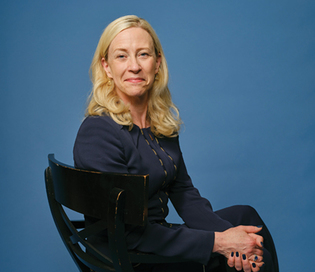
Chris Buck
Dear Fellow Alumni,
For as long as I’ve been an educator, one question has animated the work that I do: How do I unlock potential to make a difference? Working to unlock potential in individuals and ideas—to spur creativity, to drive innovation, to solve problems—has motivated the teaching I’ve done, the scholarship I’ve pursued, and the communities and organizations I’ve joined. I knew when I assumed the responsibilities of president at Yale last summer that I would be able to formulate a more meaningful response to that central question than I ever had before. What I did not know then was how urgent answering it would become.
Over the past six months, I have traveled nationwide to make the case to audiences large and small that higher education—and the exceptional faculty, students, and staff who power it—has been a force for good. I have no shortage of data. Yalies have shaped our understanding of the world, changed the landscape of our economy, introduced innovations that defined modern living, and made discoveries that expanded human potential and extended lives. Our alumni have drawn on lessons learned in New Haven and put them into practice in all 50 states and around the globe.
I know it. You know it. But this is not a discussion we can keep to ourselves. Yale has a voice in conversations of national and global importance, and we must use it. How do we ensure that Yale can continue to unlock potential for future generations? We make our presence known.
I write this column now as I prepare to do just that at the Aspen Ideas: Health conference in Colorado. There, I will sit on a panel with leaders from different sectors and moderator David Leonhardt ’94, editorial director for the New York Times Opinion section, to reflect on how universities have served as engines of health innovation and protected national competitiveness. I’m looking forward to hearing the perspectives of fellow panelists Alex Azar ’91JD, who served as secretary of health and human services from 2018 to 2021, and Brett Zbar ’94, who is managing director and global head of life sciences at General Atlantic. Both Alex and Brett have ideas about what more we can do as a nation to maintain America’s edge in scientific research and medical advances, and I’m grateful for the chance to share how Yale can contribute to that effort.
The collaborative relationship that Yale has had with the federal government and industry has saved millions of lives. In 1960, Dr. Louis Gluck, a Yale pediatrician and researcher, led the development of the first neonatal intensive care unit (NICU) in the world, designed to provide focused, specialized care to at-risk newborns. In 1979, Yale researchers spearheaded the first insulin pump for children to manage the treatment of diabetes. Working with the federal government and private companies, these and other discoveries revolutionized medical care in New Haven and around the world. That work has continued, sparking clinical trials, critical research, and unicorn startups helping innovation to scale.
But there is so much more to be done. With targeted support, we can accelerate progress, eradicate disease, and improve the lives of millions of Americans. I glimpse that potential when I tour our facilities and talk to our students. I see it when I read about the companies and labs that Yalies have gone on to found. As determined as I am to tell their stories when I travel, I know that innovation also requires listening. So, I welcome all views, including criticism, on how we can continue to improve.
In Aspen, I expect the other panelists and I will find important points of consensus. But I know that our viewpoints will diverge as well. Disagreement is nothing to fear. It helps us refine our opinions and revise them. It can be exhilarating and thought-provoking. At Yale, I am proud that our doors and our minds are open. How do we unlock potential? We show up, we listen, we contribute, and we keep moving forward.
Sincerely,
Maurie McInnis ’96PhD
President
Professor of the History of Art
 loading
loading